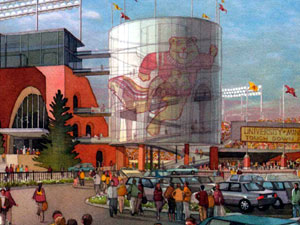Audio
Photos
More from MPR
Your Voice
| |||||||||||||||||||||||||||||||||||||||||||||||||||||||||||||
Pawlenty stadiums plan would have teams pay one-third the cost
March 15, 2004
Gov. Tim Pawlenty has entered the state's stadium debate, proposing to build two new facilities for the Minnesota Twins and Vikings at a cost that's likely to exceed $1 billion. The governor's plan would split the costs in an unspecified way between the teams, local host communities, and the state. Stadium supporters cheered Pawlenty's suggestions, but critics say the governor has reneged on his promise not to use state dollars for ballparks.
St. Paul, Minn. — Throughout his time in the Legislature, Gov. Pawlenty was a reliable "no" vote when it came to state assistance for professional sports facilities. But he says with the Twins on a year-to-year lease at the Metrodome and the Vikings lease set to expire in seven years, the time had finally come to act. And he says his new perch as chief executive required a broader vision.
 | |||
"As governor, you have the responsibility to solve large problems, statewide, large problems. We need to do what we can within reason and in a responsible fashion to keep our teams here. Bottom line: I don't want to lose the Vikings and the Twins on my watch," he said.
The plan is a rough framework that would create a seven-person Minnesota Stadium Authority to work out the fine points, including where the facilities would be located.
Minneapolis and St. Paul are front-runners for a Twins ballpark and Anoka County appears to have the lead for a Vikings stadium. The governor's package would require the teams to pitch in roughly one-third of the costs. The eventual host communities would raise local taxes to fund their contribution, and would have the option of putting the new levies to a voter referendum or not.
The state's share would come from a portion of whatever income or sales taxes the facilities generate above what's currently collected at the Metrodome. The governor argues those extra revenues wouldn't exist without a new stadium and therefore can be diverted from the general fund without compromising his pledge not to provide direct state funding. Critics say that's dubious.
"(The plan) certainly looks like a direct subsidy. Direct taxpayer subsidy. Period," said Rep. Phil Krinkie, R-Shoreview, who has been a vocal opponent of state funding for ballparks. He notes that the many economists argue that stadiums don't actually boost economic activity, they merely siphon it from other parts of the economy that do contribute tax dollars to schools and health care and transportation. Krinkie says no other Minnesota business could count on such a deal.
"Why do we now need to have some other new process by which we capture sales and income tax to pay for a bailout of professional sports?" said Krinkie.
Pawlenty acknowledges he's not ready to make similar offers to other businesses.
"Professional sports stadiums are a fairly unique creature. And we need to treat them as such. They're not exactly the same as other businesses for all the obvious reasons," the governor said.
Among those reasons, administration officials point to baseball's federally-protected monopoly. And they say the games draw fans from out-of-state who wouldn't otherwise spend their entertainment dollars in the Twin Cities.
Both teams reacted positively to Pawlenty's ideas. But Vikings president Gary Woods says getting it through the Legislature will only be the first step before hashing out the details with the stadium authority.
"If that happens, then we have a framework of dealing with a very small group of people and then negotiating the finer points of a new stadium. So that is really a plus," Woods said.
Woods say the team has some reservations, but wouldn't elaborate. The Twins, like the Vikings, have argued for years that the current Metrodome doesn't generate the revenues necessary to consistently field competitive teams.
Jerry Bell, the president of Twins Sports, also applauded Pawlenty's initiative, but he says it's too early to celebrate. In particular, he says that the final deal should not impose too many costs on the team, thereby negating the whole rationale for seeking a new ballpark.
"Some of the financial contributions could be a stretch, because we'd also have to assume all the operation and maintenance. We have to contribute profit sharing. We have guarantees to make. You know, there's a pretty heavy burden there. But who knows?" he said.
The University of Minnesota Gopher football team also plays at the Dome, but wasn't included in the governor's plan. The university is moving on a separate track to finance a $222 million stadium in large part through private donations. Current plans call for the state to pick up no more than a quarter of that project's cost.
Pawlenty says he hasn't forgetten the Gopher's needs, leaving open the possibility for three new stadiums in the near future.
|
News Headlines
|
Related Subjects
|


